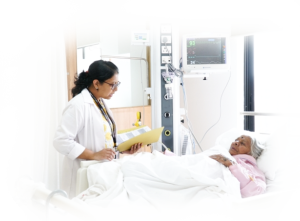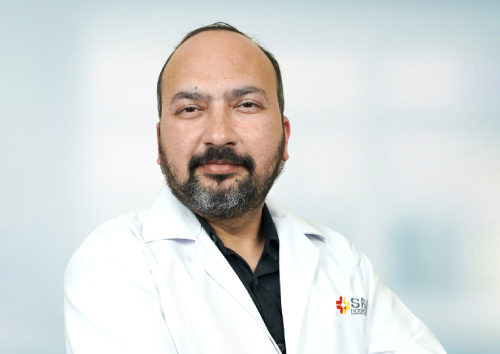
Critical Care
At SPS Hospitals we treat extremely ill patients with life-threatening illnesses and organ failure who need intense monitoring and life support equipment. Our medical experts with specialized training in critical care are available round-the-clock, providing the entire range of critical care services. These healthcare specialists are trained to provide 24-hour care, and to constantly monitor the vital signs of the patient.

Facilities at SPS Hospitals
The ICU and Critical Care Unit is built with cutting-edge infrastructure and state-of-the-art technology and high-end equipment is used for the best outcome.
- Invasive and Non-Invasive Ventilators for patients with respiratory failure
- Oxygen therapy
- ECMO Support
- Peripheral IV cannula / central venous cannula for giving fluids and medicines to the patients
- Advanced Hemodynamic Monitoring
- In case of kidney failure, Hemodialysis machines including CRRT
- Catheters and flexible tubes for draining or getting fluids out of the body
- Feeding tubes for nutritional support
- Tracheostomy tubes for breathing support
Treatments Offered at SPS Hospitals
At the Critical Care & ICU department at SPS Hospitals, treatment is offered for several medical conditions, including –
- Heart attack
- Sepsis
- Stroke
- Traumatic Brain Injury
- Shock
- Trauma
- Cancer-related Intensive Care
- Respiratory (Lung) Failure
- Post-operative Intensive Care
- Heart Failure
- Ruptured Brain Aneurysm
- Burns
- Allergic Reactions
- Pneumonia, ARDS
- Poisoning.
Procedures Performed
Depending on the patient’s condition owing to which they have been admitted to an ICU, different procedures and tests may be performed at SPS Hospitals, including –
- Airway Management – To maintain or open the airways of an individual, different medical devices are used like the oropharyngeal airway, nasopharyngeal airway, Laryngeal mask airway, Endotracheal intubation.
- Cardiovascular Management– Various Invasive Monitoring devices are available including Central Venous Cannulation, Arterial Lines, IABP
- Chest Drainage Tube Insertion – Also known as a chest tube thoracostomy, inserting a chest tube is an emergency procedure in most cases.
- Advanced Cardiovascular Life Support.
- Diagnostic Bronchoscopy – Diagnostic bronchoscopy is done to check the lungs as well as the airways to find the cause of lung problems if any.
- Liver/kidneyTransplant
- Craniotomy – The procedure that is performed to expose the brain by surgically removing a part of the bone from the skull is called a craniotomy.
- Plasma Exchange
- Thoracentesis – The procedure of removing fluid or air from the area around the lungs. It is performed when there is pleural effusion.
- Peritoneal Drain Insertion – This process involves inserting a tiny plastic tube to either drain excess fluid or deliver anticancer medication into the peritoneal cavity.
- Mechanical Ventilation
Why choose us?
SPS Hospitals Critical Care & ICU Unit has successfully treated some of the most complex cases and critical patients.
- Patients can get comprehensive critical care that is integrated and covers almost all medical needs at affordable cost.
- We have highly skilled & experienced physicians and surgeons to provide collaborative treatment plans. This enables our critical care physicians to offer prompt, excellent and individualized critical care for each patient.
- All of our nurses have received critical care training, and they give each patient round-the-clock bedside monitoring and care.
- In addition to critical care beds, we have neonatal care units as well as a neuro ICU. SPS Hospitals also has automated laboratories, 3 Tesla MRI, 128 3D, and 4D ultrasounds, bone densitometry, and 32 Slice CT equipment.
The SPS hospitals has a specialized ICU and critical care department that provides top-notch infrastructure, enabling better treatment for the most critically ill patients.
FAQs
Patients who are critically ill are admitted to the ICU. They are connected to advanced monitors for measuring their vital signs. The patients are managed by an interdisciplinary team with round the clock availability of a dedicated critical care team.
When enough oxygen doesn’t reach the lungs, it becomes difficult for one to breathe on their own. This is known as respiratory failure. These patients usually require oxygen therapy and mechanical ventilator support.
Several medical conditions that are usually severe such as sepsis, shock and respiratory failure, are often treated in the ICUs at SPS Hospitals. Other such conditions include acute liver failure, multiple organ failure, stroke and pulmonary embolism


Dr. Vinay Singhal
Director - Critical Care & Emergency Services

Dr. Puneet Chopra
Associate Director - Critical Care

Dr. Sachin Goyal
Associate Director - Critical Care
Book Your Consultation Now
